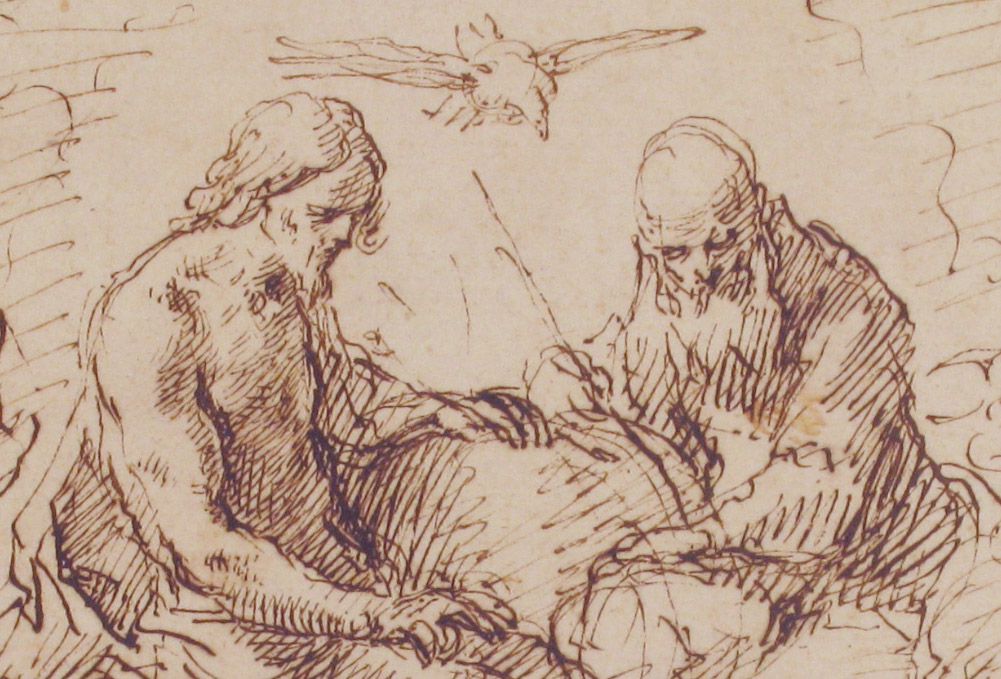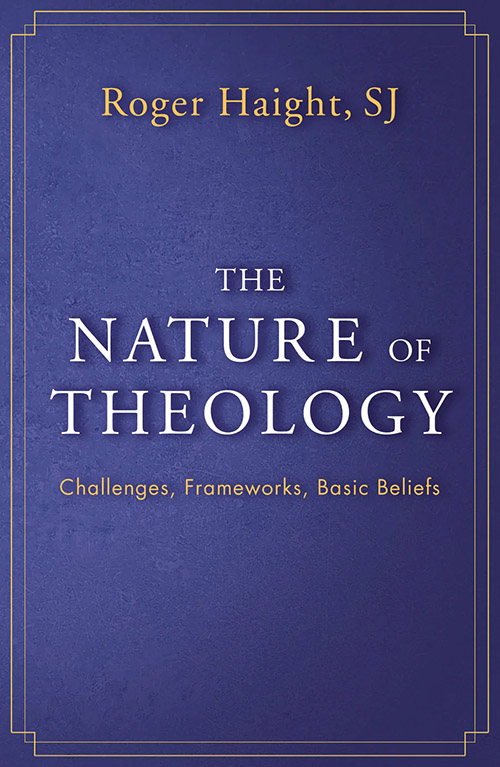
"The Holy Trinity in Glory" (detail), a 17th-century ink drawing by Italian artist Simone Cantarini (Metropolitan Museum of Art)

In The Nature of Theology, Roger Haight stands steady atop the shifting tectonic plates of two histories: that of the world and that of religion. His latest contribution to interreligious and ecumenical dialogue gives the reader a gentle taste of his lectures at Union Theological Seminary in New York City, where he is visiting professor of systematic theology.
It is a book for anyone interested in the place of theological discourse in the academy. It is an exegesis of theological thought, and of how to think theologically, within a world that presents four distinct difficulties for the Christian theologian.
The first of these difficulties is the theological dialogue with science. It is not new, and it is constantly changing.
The second is the presence and continued growth of liberation theologies, which can (and often do) create internal ecclesial tensions.
Next, a general acceptance of the religious traditions of others, a systematic pluralism if you will, challenges Christian theology.
And, finally, ecclesial scrutiny of the study of Christology, particularly considering the three aforementioned difficulties, challenges further investigation into the meaning of the divinity and humanity of Jesus Christ.
In The Nature of Theology, Roger Haight stands steady atop the shifting tectonic plates of two histories: that of the world and that of religion.
So, what is a theologian to do? There is no whiff here of Haight denying Catholic teaching. Granted, his writing is not often easy. Even so, the careful reader can settle back and ponder the points he makes in the world around us, not in the rarefied world of a Catholic seminary.
His aim is to explain, as many others do in secular universities and ecumenical seminaries, how theology in general and Christian theology in particular can be accommodated and understood in the contemporary cultural context.
Haight presents three intellectual problems attacking Christian theology that all relate to the question of what is real: metaphysical skepticism, relativism and ontic pessimism. If God is real, then the task of theology is to answer these attacks.
The first, metaphysical skepticism separates God, and therefore theology, from the world. Relativism, the outgrowth of pluralism, cancels the possibility of objective truth. Ontic pessimism, like the Velveteen Rabbit, questions the "really real." Each is a problem spawned in modernity, and each must be addressed by theology.
These three interrelated problems of contemporary culture — metaphysical skepticism, relativism and ontic pessimism — enhance the problem of evil in theological discussion. As Haight points out, "Global news communicates an all-enveloping shroud of negativity that wears people down and drains a sense of ultimate hope from worldly existence." How, we ask, can there be a God who allows all this?
Only after presupposing the apparent hopelessness of the task does Haight present Christian theology as an answer. His three concluding chapters, one each on God, Christ and the Spirit, present the core of Christian belief. God as Creator, Jesus Christ as Mediator and God as Spirit support the tenets of Catholic teaching alone and in dialogue with Christian and non-Christian theologians.
'Revelation of God includes revelation of self in relation to God and God to the self.'
—Jesuit Fr. Roger Haight
God as Creator is unlimited, without boundaries, and "suffuses all reality, penetrating the world and each creature. ... God is not 'up there' or 'out there' beyond an expanding universe, but within it without being a part of it."
Whereas theology comes into conversation with science, the act and the fact of creation present what Haight terms theology's "mystical intent." God is encountered subjectively by the person, and that encounter is wholly relational. As he writes, "Revelation of God includes revelation of self in relation to God and God to the self."
Here the reader begins to understand his project all along. God, as Creator, Mediator and Spirit can only be appropriated as "Presence," each individually and all as one. The appropriation of God requires the understanding of and ultimate rejection of metaphysical skepticism, relativism and ontic pessimism, and the simple and singular acceptance of the fact that God exists, that God Is.
Hence, Jesus Christ and the complicating problems of Christology as it has been taught across centuries cannot be separated from the understanding of the Creator.
In his chapter on Jesus Christ as Mediator, Haight does not attempt to present only Catholic teaching, but rather to present the essential topics, the "lay of the land" as he puts it, of the "Christological framework of Christian faith." As he notes, Christian theology appears to have spent more time on who Jesus was and is than on what he said and taught.
But, as Haight points out, "When someone asks, 'What is God like?' the Christian responds, 'God is like Jesus.' " That is, the reality of God transcends the imagination, so it is the teaching and action of Jesus that represent the "transcendent and unnamable Presence."
Advertisement
It is the life, death and resurrection of Jesus as taught and increasingly understood over the centuries of Christian thought that demonstrate the desire for Christian belief even in the face of culture's negative outlooks on religion in general, and especially on Christianity.
Haight guides a tour through the development of the arguments about Jesus' resurrection and especially his divinity. At its historical root, "messiahship did not entail divinity," so Christianity only gradually accommodated that fact. Constantine, Arius, Athanasius, St. Paul, Bernard of Clairvaux, Thomas Aquinas, even Paul Tillich, Edward Schillebeeckx, Karl Rahner and David Tracy appear in these sections on the historical development of Christian belief: Jesus Christ was and is truly God and truly human.
Even so, Haight points out that the sections on Jesus Christ are ecumenical discussion-starters, because "matters of doctrine represent opinions within a wider conversation addressing different audiences."
The book ends by returning to the cultural pessimism that recognizes both the depth and density of human suffering and humanity's inability to end or even address it. The final chapter, "God as Spirit" encourages belief that God acts in the world and in individual human lives.
Again, ever the educator, Haight outlines the different ways the Spirit has been understood by five different theologians: Augustine, Thomas Aquinas, John Calvin, Friedrich Schleiermacher and Karl Rahner. Each has a distinct approach, and the brief descriptions of their outlooks leads to a discussion of Christian spirituality, "the way Christians lead their lives in relationship with the God revealed in Jesus Christ."
It is the personal freedom in the light of the Spirit that gives the Christian the ability to live freely in the face of contemporary opposition. And, as Haight writes, "An essential feature of a response to cosmic pessimism lies in the theology of resurrection to eternal life together with the spirituality implicit in that belief."
In sum, Christian spirituality presents the promise that is the last word in this book: hope.








